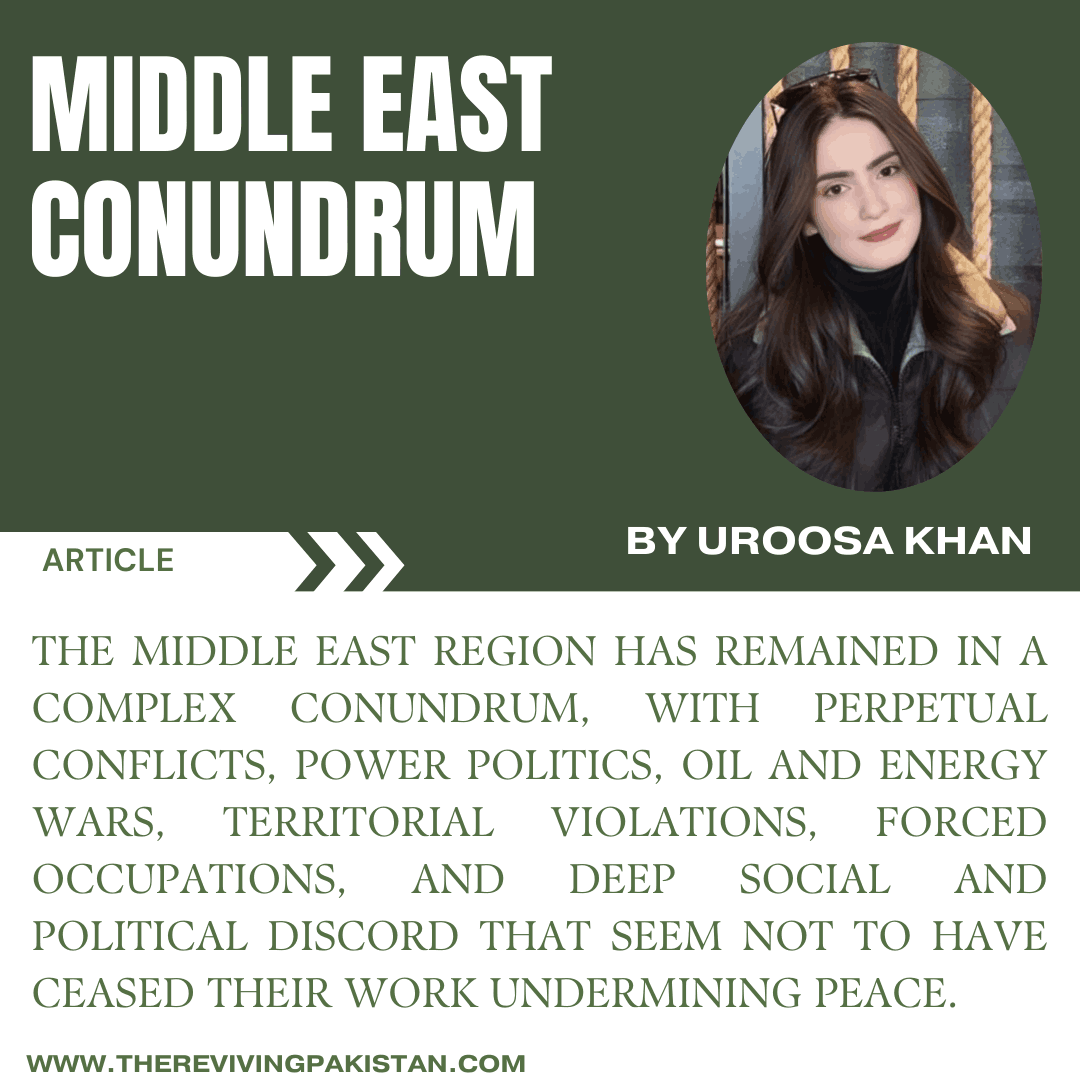
Uroosa Khan
The author is a research analyst with having keen interest in foreign policy, history, geopolitics, and international relations.
The Middle East region has remained in a complex conundrum, with perpetual conflicts, power politics, oil and energy wars, territorial violations, forced occupations, and deep social and political discord that seem not to have ceased their work undermining peace. For decades, the region has been a theatre of war. The glaring example is the unresolvable Israel-Palestine conflict since 1949. There is wide condemnation of how Palestinians are being treated by Israel, being viewed as a stark violation of human rights by a nation that boasts of democratic values. The recent all-out war in Gaza, sparked by a surprise Hamas attack on Israeli territory, has already taken thousands of casualties and wounded, evicting hundreds of thousands of Palestinians from their homes and leaving them homeless. Schools were destroyed, and hospitals and even other critical infrastructure were greatly damaged.
Often overlooked in the debate about Palestinian rights is the right to live in their ancestral homeland, where they have lived for centuries. It was the Balfour Declaration of 1917, the power of which only paved the way for the Jewish population to settle in Palestinian territories under British authority. According to international law, the violation of any state’s territorial integrity amounts to a grave breach. However, so far, there is hardly a word said by global leaders concerning atrocities carried out by the Israeli government against the Palestinians. Only this silence escalates the regional escalation that has more general implications for both the Middle East and the world.
Israeli military actions have been directed not only at Gaza but at Lebanon, Yemen, and also in other parts of the region. As a significant backer of the Palestinian cause, Iran seems to strengthen its so-called “Axis of Resistance” against the latest massacres of Hamas and Hezbollah leaders. Iran seeks to challenge the expansionist agenda of the perceived threat, Israel, by making alliances with entities such as Hamas, Hezbollah, and the Houthis. The recent attacks by Israel on Lebanon marked a new chapter in this war, emphasizing the escalating usage of high-technology-based warfare within their operations. Israel’s skirmishes with Lebanon and other bordering nations reveal an unwillingness to find peaceful solutions. Fearing Iran’s military power, the United States and Western powers have been giving great support to Israel. Therefore, Israel seems emboldened to continue the military operation.
Even though Iran complains that Israel violates territorial rights and indulges in aggressive acts, Iran has indicated a concern to avoid a direct war. If a direct war between Israel and Iran occurred, the consequences would be disastrous. Oil prices would increase, and energy politics will once again take centre stage. Israel has threatened to attack Iranian oil refineries, a move that could be the trigger for a conflict of enormous dimensions worldwide. In return, Iran might close the Straits of Hormuz, one of the world’s most crucial passage routes, used by global oil shipments. The Axis of Resistance under Iran might also attempt to try and seal all shipping routes through the Red Sea, with a possible impact on global trade patterns and further increasing oil prices. China is the largest importer of oil coming from the Middle East; its interests in the region will be materially affected by high oil prices. The developing countries would be adversely affected by a surge in oil prices, thus compounding their poverty and destabilising a fragile economy.
It is an ominous portend that the soon-to-be-horrendous conflict in the Middle East expands into a global confrontation. Suppose alliances are formed: Israel and Western countries on one hand, Russia, Iran, China, and others on the other hand. Polarization would not only have social and political implications but also economic ones. Middle powers like Turkey and Saudi Arabia would thus be the crucial ones, as these countries possess interests of their strategic bargaining power, capable of reversing the power balance. History has it that Turkey has always stood by the Palestinian side. So, perhaps it will hold a determinative role as the nation formulates its response to the situation. Saudi Arabia, on the other hand, is an influential member of OPEC, and in this case, it could use its power to control the output of oil production reduce it to intensify the economic effects, or boost it to counterpoise the same.
Furthermore, a protracted conflict in the Middle East may create huge refugee flows and exert pressure on border countries with the potential for humanitarian disaster. It will exacerbate social tensions amongst host countries as they struggle to manage the displaced populations, and this may further drive greater anti-immigrant movements. Economically, a protracted conflict will translate into increased defence spending by participating nations, leading to the sidelining of social and developmental projects.
As the global superpowers, it goes a long way to state that the United States and China in particular have enormous roles to play in this scenario. The U.S. has traditionally been an ally of Israel and would likely continue to be a source of military and financial aid to the country in case a wider conflict happened though this may put pressure on its other key regional players’ relations. China has become a significant player in the Middle East through such initiatives as the Belt and Road. Here, China will strive to make every effort to raise a voice that will appeal to stability. However, if its oil supplies are under threat, then it cannot remain passive and will have to become proactive – maybe even act as a mediator – to cut down the tensions.
Hence, the Middle East conflict is multifaceted and affects a much larger area and arena beyond the region itself. A peaceful resolution is very badly needed to prevent a global crisis. It, therefore requires a very elementary step wherein the United States and China, two superpowers with a large influence globally, would have to take precedence over the diplomatic requirements to seek solutions for the issues driving this juncture of conflict in the first place. If this development continues unchecked, the Middle East will become a breeding ground for instability and uncertainty, with serious implications for international peace and security.

